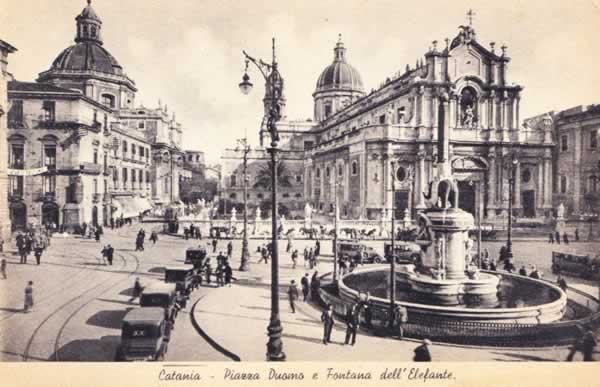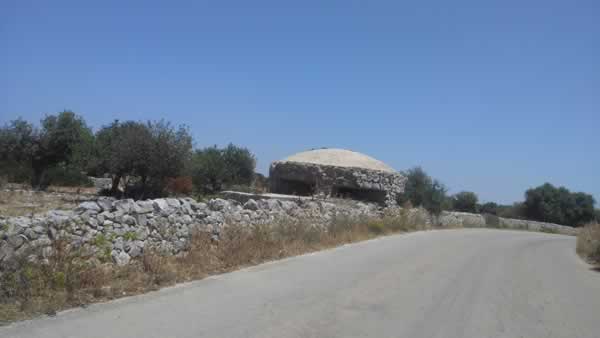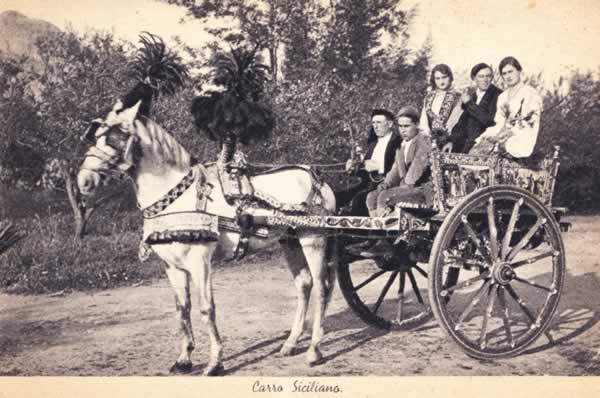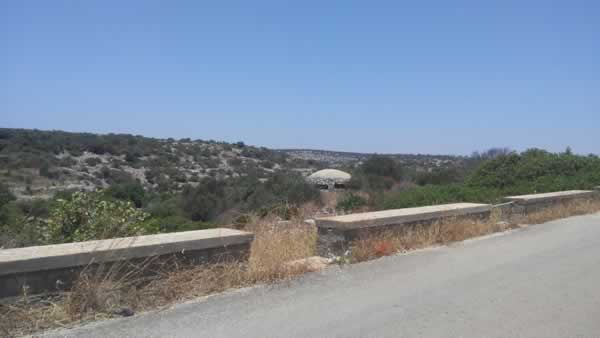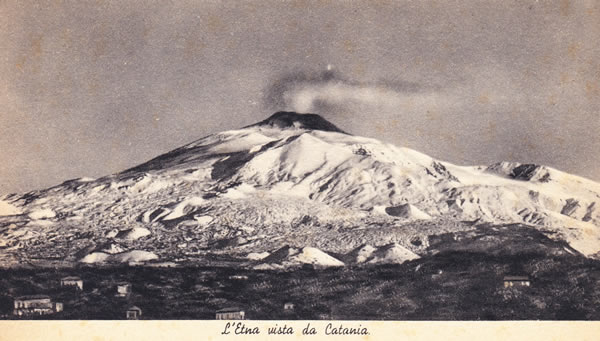| Sicily and across to mainland Italy | |
|
Memorabilia
|
Jim was finally able to confirm what Pip probably suspected, that he had been unable to communicate with her because he was involved in the preparations for the invasion of Sicily which began on the night of 9-10 July. The Eighth Army landed in south east Sicily which may explain why the only pictures Jim had of Sicily were four postcards of Catania on the east coast at the foot of Mount Etna.
Piazza del Duomo, Catania, Sicily complete with elephant fountain The Regimental History states that early in July most of the Regiment sailed north up the Suez Canal aboard the troopship Orontes and Jim commented that "Fred and I did an enormous spud bashing fatigue in the smelly bowels of the ship". The History goes on to explain "A large number of maps, some thirty-seven for each vehicle, were issued and a brochure on the island's topography and the habits of the natives had to be read and absorbed; also rations of food and rum were issued and stored on each tank." The army produced brochures for both Sicily and Italy to prepare the troops for what they would find after the invasion. Extracts from both these publications may be seen on the Soldiers' Guides page in the Memorabilia section of this site. The weather deteriorated on 9 July when they were at sea and Jim recalled that "most ships including ours lost their barrage balloons in the gale. Escorting Spitfires machine gunned them with no apparent effect. Ribald cheers from all ships!" They arrived at the beach at Avola on 10 July and disembarked from Orontes at 1030 hours. According to Jim "We carried our bedding (very important) - as much food as we had scrounged and a minimum of ammo (because ammo is very heavy). Night in olive grove - air raid on ships - lots of shrapnel coming down." The History describes the progress of an advance guard up the road to Solarino on the morning of 13 July, led by Sgt Hampson. After engaging the enemy, first in tanks, and when the road was blocked, on foot, "5 Troop accounted for a total of one divisional general, three brigadiers, four staff officers, fifty-odd other ranks, eight tanks, six guns, twenty-nine trucks, four cars and three motorcycles." By the 15th the opposition was German rather than Italian and beneath a description of the action Jim wrote "All this fighting was very fierce indeed". Mosquitoes were a serious problem and Jim "got my malaria when on guard duty" in the Primosole Bridge area. The Regimental History reports that "Many members of tank crews were to disappear from the Regiment during the ensuing weeks and it was with very great irritation that squadron commanders later learnt that when 'malaria' casualties recovered they were not as a matter of course returned to their unit but were placed in a pool from which replacements were sent to other regiments." However Jim added "When I got over my malaria (I was in hospital in Taormina) the unit had moved. I walked down to the main road - sat on a wall and waited to see a truck with a black rat on it, flagged it down and rode back to the H.Q." Sicily, 23 July 1943 “Woman Dear, I cannot remember how long ago it is since I last wrote to you but it must be a considerable time. It is also many moons (or seems so) since I last heard from you. I suppose you will have guessed the whyes and wherefores – we are now in Sicily. It is permissible I believe to tell you that. It explains numerous gaps in my letter writing for some time back but of course I couldn’t tell you so. The country is certainly a big change from the desert but I cannot quite decide which is the hotter – it is much more relaxing here I find.” “It is a great pity that the invasion (which is one thing I thought we would avoid) took place so early in the year. In another eight or ten weeks one will be able to guzzle grapes, peaches, oranges, plums, almonds, etc. etc. to bursting point but we don’t do so badly. Our rations (all tinned) are very good indeed and we are looking forward with foreboding to the day we return to normal ones. At present I’m full of Scotch broth, oxtail and tinned pears.” “I think you would like Sicily, Pip, loads of hills with little townships perched on the sides – most of them a little knocked about now of course – and lots of trees and shrubbery. It has a much more English look about it than either Egypt or Palestine or even S. Africa, the fields being smallish and irregular with hedges which although cactus, look like our own hedges at a distance. There are loose stone walls as in Derbyshire and the Lakes. Many hillsides are terraced to grow almonds and there are plantations of orange, pear, lemon, plum, pomegranate trees in the valleys. A pleasant place if it wasn’t for the bangs. The peasantry mind their own business and are not unfriendly – many appear the very opposite. What else can they do of course – they are very poor and illiterate and live in a state of semi-feudalism sleeping in sundry cases with the livestock. Like the Irish, America is their Shangri-La, many have been there or have relations there, some of them are in the U.S. Army. The usual mix-up.”
A wartime bunker beside a "loose stone wall" and plantation in Sicily Many thanks to Mike Handy for the two colour photographs on this page. They were taken in 2017, inland from Sampieri, which is on the south coast of Sicily. Jim referred to Lord Haw-Haw, the nickname of William Joyce, an Irish American who broadcast Nazi propaganda from Germany during the war. Clearly, the troops were able to listen to, and laugh at him, even in Sicily. Jim went on to describe his impressions of Sicily… Sicily, 27 July 1943 “I see Haw-Haw is saying that we are glutting ourselves on fruit we haven’t seen for nearly three years. Someone may be but around me it isn’t ripe yet… We have run over more grapes than Covent Garden has seen for four years – they’re still green… I’ve seen no eggs at all and very few chickens or in fact any livestock worth mentioning… I’m sitting on the limestone step of a little barn half-way up a steep hillside. The barn is partly cut out of solid rock and roofed with rough tiles. The door is about three inches thick and inside there is nothing but a load of hay, some horse trappings on a nail, one or two baskets containing some mysterious black looking nuts, a trestle table with a straw mattress on it and a very ancient table with two drawers. Here lives an old man with patched trousers and a cap. He has a donkey which he ties to a ring beside his bed at night.”
A well decorated Sicilian horse and cart “I’ve eaten or tried to eat their ‘pasta’, a staple diet. It consists of little rolls of dough, brown and coarse and apparently full of sand and grit, boiled and sloshed with tomato sauce. Horrible stuff. I managed two or three forksful and then gave up. Then they insisted on me having some cognac which must have been over-proof. A wine-glass nearly killed me. I was rotten for two days afterwards. There must have been nearly twenty people living in that one roomed cottage.” The remaining letters from 1943 were addressed from “B Sqdn. 44 R. Tanks C.M.F.” indicating that Jim was now part of the Central Mediterranean Force, rather than M.E.F. – the Middle East Force. He touched on the invasion, its visible effect on Sicily, and the local opinion of Mussolini. He continued to describe the country before giving a further possible reason for the long delay between letters. Sicily, 9 August 1943 “At present I'm sitting under an olive tree writing in comparative luxury – namely a table (cane, rather rickety) and a chair (very ditto). To my left front is a smallish town rising up a hill-side with a walloping big church on the top complete with dome. This particular town got away with it fairly lightly and is more or less intact. Mucking about over the roof-tops is a shufti-plane in other words a reccy-plane. It is one of ours – they’re all ours nowadays – hundreds of them. I haven’t seen an Axis plane since July 15th when there was a tip and run affair by four J.U.88s – and did they get a reception! I’ve never seen as many wrecked Jerry aircraft in my life as are on a certain airfield – it is littered with them interspersed with big bomb craters current fashion dropped on them by the RAF. I doubt if a single plane got away… Musso was very proud of that airfield once” Sicily, 13 August 1943 “... we abide in a type of orchard, mainly lemon trees, but with patches of maize. The ground, thoroughly ploughed for generations I suppose, is a fine brown powder about a foot deep into which the lorries sink up to their axles.” “At present a craze for learning Italian is sweeping our crowd, chiefly I think because it seems the ‘Open Sesame’ to almost anything – naturally enough. Fred is fairly efficient already owing to him possessing a Hugo’s Italian Course… We have however ‘acquired’ a very good English – Italian dictionary.” “In a few weeks now the war will be four years old – I’m afraid it is going to outlast the last one. What price my original forecast of five years in 1939? I don’t think I’ll be very far out. One thing is very certain Benito is no longer Il Duce – one has only to say ‘Mussolini buono’ to these people to receive interjections of all kinds to show their opinion of him. They cut their throats with their fingers or spit in the street and stamp their feet. Not that they love the Italians at all – their attitude to Italy is similar to that of the Irish Free State or should I say Eire to England. They say Musso made big promises but carried none out and systematically taxed them out of the little they had which has never been much.” “Most of the villages have that decrepit air very reminiscent of the Eire villages except for the residence of the local Fascist and the buildings erected for some administrative purpose – these are all grandiose affairs though often only lathe and plaster. An ordinary bullet often goes right through a building and out the other side!” Sicily, 26 August 1943 “I’m so glad to hear that you received the L.C. telling of my arrival here. It was all surprisingly uneventful I assure you although we naturally expected all sorts of unpleasantness.” “The only thing to break the monotony of the trip over was provided by a Wellington bomber, one of the escort, which obligingly created a little sensation by gently falling into the drink from whence the bedraggled crew was fished out by a light cruiser. Crawling up the last few miles very silently on a glassy sea under a thin smoke screen was a little eerie but that was all.” “Everywhere are orchards and groves on man-made terraced fields – the amount of labour required to do it must have been enormous and taken hundreds of years of semi-slave labour. There is a most intricate system of irrigation as the place is rainless from May to Oct. Nov. Every stream is harnessed between concrete walls and must serve its purposes."
Another bunker with terracing beyond on a hillside in Sicily "I was bathing the other day in icy water coming straight from Etna… Some days the smoke from the crater is almost non-existent and is never in great volume. Where the lava is bare it resembles nothing more than huge slag heaps, very ugly stuff which will cut you to ribbons in very quick time.”
Etna complete with "slag heaps" seen from Catania, Sicily Jim wrote in the Regimental History it was "like a depressing moonscape, black lava, sulphur and SO2" “At present I’m in dock recovering from malaria – another reason for me to dislike Sicily. I never knew it was possible to get so hot with a fever without bursting into flames or at least charring a little! However it’s all over now and I should be rejoining the mob shortly. I’m full of differently coloured pills all with a horrible taste.” Jim's service record shows the dates of his visit to hospital beneath a reference to Husky Force. Operation Husky was the invasion of Sicily. It appears that 186 Field Ambulance was based in North Africa (N.A.)
In September Jim reported that he was out of hospital but still recovering and weak. He went on to describe how close he was to Etna and then had some thoughts on how the war was progressing in Russia and generally. Stalino, in the Ukraine, is now known as Donetsk. Sicily, 8 September 1943 “Have I seen Etna? Well you can’t very well miss it – it was the first sight of Europe that we got from the ships. I do not find it very imposing – not half as imposing as the Pikes for instance although it is about 10,500 ft. The active crater is not at the top but a little way down the side – not much to be seen in the way of smoke etc. As you say I hope it doesn’t erupt. Last time it wiped Messina out in 40 seconds I believe. At that rate it would get me in about one and a half I should say. There’s no explaining eruptions and earthquakes (I’ve felt two tremors) as I’ve heard the one that wiped out Messina in the North and Avola in the South left Catania untouched and that is just at the foot of the mountain.” Sicily, 10 September 1943 “The latest rumour is that Jerry has evacuated Stalino – maybe true – probably is. I don’t quite know what to make of the Russian affair – there is no heavy fighting going on – I think Jerry is pulling in his horns and transferring some of his strength to other theatres – it’s only a surmise of course. I doubt if he is losing many men or much material although he is losing valuable ground and more prestige. The change that has come over the war stage is most noticeable Pip to men like us who experienced Jerry in his early days then rested, and then came back. In the early days one could sense the sheer Power behind him as well as the weakness behind yourself – all this quite apart from the material evidence always before your eyes. When we came back into it the reversal was complete. Now one can sense enormous Power behind oneself and nothing behind him to equal it.” Jim confirmed the name of the ship he left Britain on, the ‘Sobieski’, writing that it used to be a Polish emigrant ship to America in peacetime but “hell ship in wartime”. He also recounted some stories at the expense of the Americans including this one “… supposedly said by a Jerry major to one of our people. ‘Ah, the Americans, yes – the RAF come over – we duck, the Luftwaffe come over – you duck – the Americans come – we all duck’. Poor Yanks – they get no change out here at all. Actually I don’t think they’ve done so badly at all – if they didn’t cart so much kit about with them.” The next letter, dated 12 September, was nine days after the Eighth Army landed in mainland Italy and an armistice was agreed. Jim began by referring to his malaria and then went on to give his views on the armistice. Italy, 12 September 1943 “I feel quite O.K. again now and the skeeter season is nearing its end so perhaps we’ll get a little peace. The flies are just as bad as they were in Egypt. I suppose you got the news of Italy packing in about the same time as we did. The fact that it was signed on the 3rd explains away the ‘phoney’ feeling I had about our landings at Regio. There didn’t seem any real effort behind it all. How did folk in Blighty react? The Army here was entirely indifferent – with a little exaggeration one might say there was scarcely a comment passed about it but the civvies went a little potty. We were doing a rather lousy night march and the villagers were dishing out free vino of all kinds to the troops whenever we stopped in a village. Many farms had bonfires blazing outside the buildings and I saw one or two lanterns hanging outside the doors of houses in the villages. For them the mala guerra was finito but I think most of our blokes felt as I did – that it wouldn’t make a lot of difference – Johnny Wop has been only waiting to be collected anyway for the last six months or more. The only resistance we had in Sicily for instance was from Jerry. I’m quite sure that Jerry has left Italy out of all her plans and calculations for some time past and he is probably telling the truth when he says that he foresaw it long ago.” "Regio", or more correctly Reggio di Calabria, is the city on the coast of mainland Italy opposite the north-east tip of Sicily, where the invasion force landed on 3 September, so confirming Jim's whereabouts. Three weeks later Jim wrote apologising for the lack of letters from him but didn’t enlarge on the reasons. The History explains that the Regiment crossed to the mainland later in the month and "the road party moved on up the west coast of the 'toe' of Italy, then by spectacular roads across the mountains and down to Catanzaro on the east coast and thence up the 'instep' along the coast to Taranto, arriving there on the afternoon of the 29th." Jim described overhauling his kit and the discovery of his pipe, a roll of film and other items. The spring clean might have been prompted by a change of vehicle: "I was now driver of the Tech Stores truck. Smashing trip!" Italy, 2 October 1943 “I have accumulated a chocolate coloured pullover with a polo collar and two darns, one grey and one blue in the elbows – very pleasing to the eye… and finally I have a tablecloth from a café in Tel Aviv which makes a respectable pillow. The rest is army kit – a thing no one bothers about at all.” Recalling the lorry load of ammunition he and Fred were responsible for in the desert he wrote: “We gave it all to Jerry in the finish anyway – stacking it neatly in the sand at Knightsbridge so that he would be able to check it all up at a glance. It was logical after all as he had all the guns before that. What an army!”
Previous page
|
| Top of Page |
